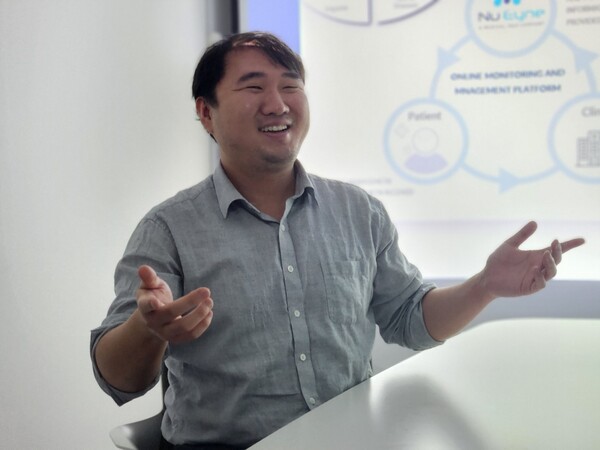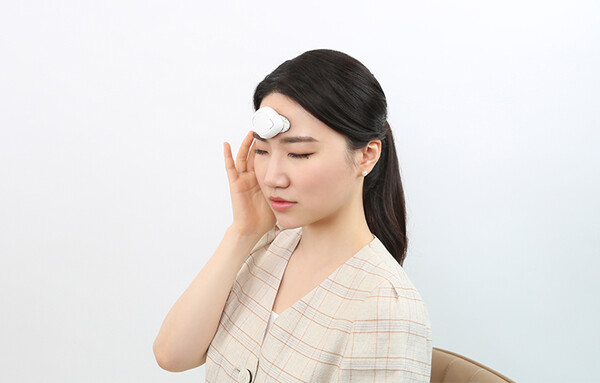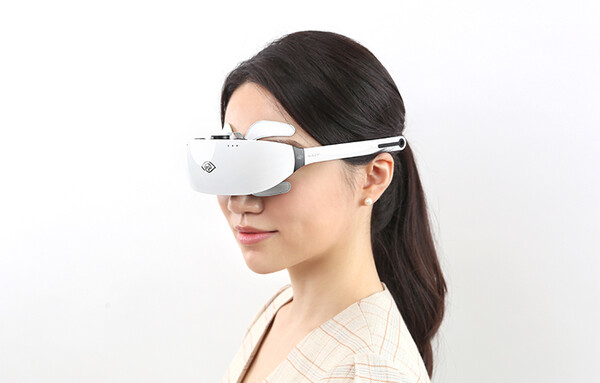Nu Eyne, a Korean healthcare start-up, was recently selected by the Ministry of Health and Welfare (MOHW) to develop bioelectronic medicine technology for the first Health and Medical Technology R&D project.
The start-up began in 2017 with just four founding members but has since grown, with an on-site wet lab for cell experiments and a dedicated good manufacturing practice (GMP) facility for its seven pipeline products in clinical trials.

The company is the winner of Johnson and Johnson’s 2017 Innovation Quickfire Challenge where it pitched the idea of solving dry eye syndrome (DES) by delivering low electrical currents through electrodes around the eye when using its goggle-type electroceutical.
Korea Biomedical Review sat down with Kim Pyung-kyu (Pk), co-founder and strategy director of Nu Eyne.
He studied biochemistry, neuroscience, and consciousness in Canada, and returned to Korea in 2015 to develop clinical studies for validating the safety and effectiveness of using electrical stimulation for neurological and psychiatric disorders, such as depression and post-stroke impairments. He said he started his career at Ybrain, another Korean healthcare start-up, but later moved to Nu Eyne to pursue a wider scope of projects.
“We are named Nu Eyne because we wanted to propose a new look at the way medical devices and equipment can deliver treatment for chronic diseases,” Kim said.
Nu Eyne’s ELEXIR, the first and only commercialized electroceutical for migraines, retails at approximately $300 in Korea. The product also won U.S. FDA approval and the company is looking for distributors.
ELEXIR applies charge-balanced, symmetric pulsed nerve stimulation to the trigeminal nerves to both treat and prevent migraines by relieving the attack intensity and reducing the attack frequency, Kim explained.

However, Kim said neuromodulation as mentioned above is not the focus of the company.
Instead, Nu Eyne wants to pursue tissue regeneration projects targeting dry eye syndrome (DES) and proliferation inhibition of cancer cells through customized electrical field stimulation to disrupt cell division and induce apoptosis, to develop personalized, wearable electroceutical devices.
“After a series of pre-clinical and clinical work, we decided to expand the applications from just modulating our nerve activities to inducing specific biological functions, such as wound healing and mitochondrial activities,” Kim said.
Accordingly, the company seek to overcome the limitations of current treatments with adverse effects and low efficacy, in diseases like DES, age-related macular degeneration, autism spectrum disorder, facial nerve palsy, tinnitus, overactive bladder, and non-small cell lung cancer (NSCLC), he added.
Nu Eye’s investigational electroceutical LUX targets corneal diseases, including DES and corneal pain, to promote faster nerve regeneration and wound healing after refractive or LASIK surgery and cataract surgery.
The company is using grants from the MOHW in 2022 to conduct a pivot clinical trial -- the equivalent to phase 3 clinical trials-- at university hospitals like Asan Medical Center and Samsung Medical Center.
“Our objective is to domestically attain medical device approval for corneal diseases this year and subsequently seek FDA approval,” Kim said.

However, sometimes patient acceptance of innovative technologies can prove challenging.
When asked about his strategies to ensure these products are safely launched in the market, he said the company was scientifically and clinically validating the technology’s safety and effectiveness and also working with the pharmaceutical and medical device companies to introduce the products into the market.
“We don’t anticipate this to be a very big issue as our products are addressing issues where patients do not presently have any treatments and thus expect to have a competitive edge by being the first to market,” he said.
For example, he also shared that the corneal disease electroceutical has a competitive edge because it focuses on treating the actual cause of the disease rather than helping alleviate some associated symptoms of the disease as eye drops do.
Still, the project has experienced some setbacks as the company had to conduct two separate clinical trials, one for those undergoing refractive eye surgery and cataract surgery and another for those who experience common DES due to autoimmune disorder, air pollution, or other reasons.
However, regarding the affordability of these devices being a hindrance for some, he described some pathways for electroceuticals to pursue reimbursement.
A device of bioelectronic medicine is essentially a medical device but most medical devices are used for diagnostics or as equipment that clinicians use. So the existing reimbursement guideline is set in that context.
Kim said the company can benchmark the reimbursement model for hearing aids as it is most similar to their electroceuticals.
He also went on to say that there might be some overlapping approaches that are adopted for digital therapeutics (DTx) such as diagnosing and prescribing doses where the physician is compensated for the time taken to help increase prescriptions of this innovative type of medicine compared to a conventional therapeutic.
Recently back from the J.P. Morgan Healthcare Conference, he shared that Nu Eyne engaged with several venture capitalists for fundraising and that the company is still preparing for more fundraising as clinical trials require plenty of funds.
In this regard, the company plans to attend other conferences throughout the year including the American Society of Cataract and Refractive Surgery (ASCRS), the Bio International Convention in San Diego, and the Medical Fair in Thailand to attract more attention to the company’s tech.
Subsequently, the company is eyeing an initial public offering (IPO) in Korea next year, he added.
Related articles
- Agility critical for start-ups to pivot expertise to healthcare needs: JLABS APAC head
- Ybrain, Chong Kun Dang to work for early depression diagnosis, treatment
- KoBioLab, Kakao Healthcare join hands to develop precision medicine using microbiome tech
- WELT’s insomnia therapy device clinches Korea’s 2nd approved DTx spot
- Dong-A Pharm jumps into electroceutical biz with Nu Eyne

